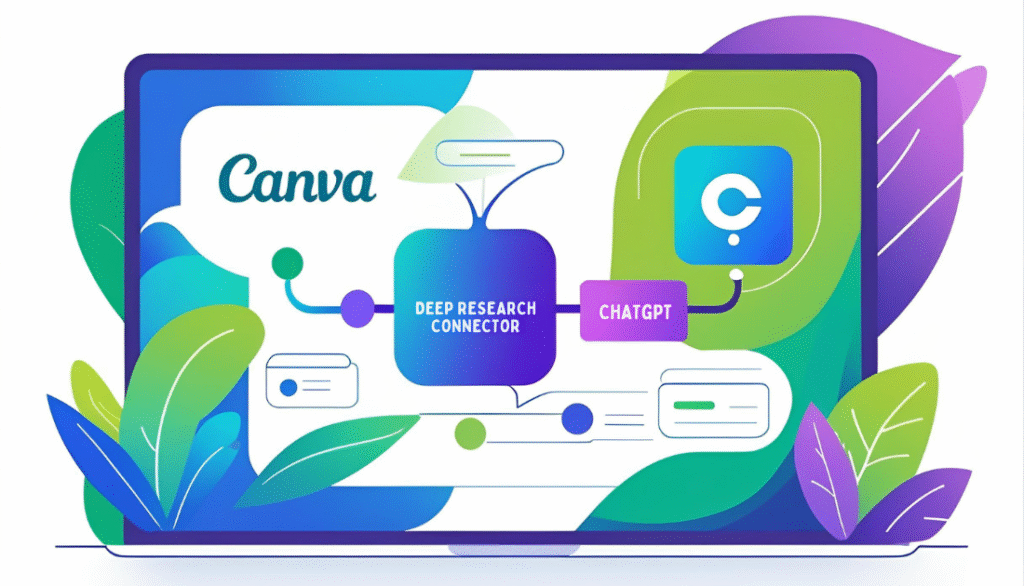Canva has announced two significant backend updates aimed at enhancing the way users interact with design projects through AI-driven tools.
Highlights
- Deep Research Connector Launched: Canva now lets ChatGPT users access, summarize, and interact with Canva projects directly inside ChatGPT—without leaving the chat interface.
- First Design Tool Natively in ChatGPT: Canva is the first design platform to fully integrate with ChatGPT’s Deep Research mode, available to all ChatGPT user tiers at no extra cost.
- Open MCP Server for Cross-Platform AI Chatbots: Canva’s new open Model Context Protocol (MCP) server allows other AI tools like Google Gemini, Anthropic Claude, and Salesforce AI to perform actions within Canva.
- AI-Powered Design Actions: Users can now trigger design workflows like pitch deck creation, media resizing, and brand asset management from their favorite AI assistant tools.
- Part of Canva’s AI Momentum: These updates follow other AI-driven launches like Visual Suite 2.0, Veo 3 video generation integration, and support for OpenAI’s o1 AI model.
- Enterprise-Grade Security: All AI interactions fall under Canva Shield—ensuring data privacy, user permission controls, and corporate security compliance.
The company is rolling out a Deep Research Connector for ChatGPT and launching an open Model Context Protocol (MCP) server, signaling its broader push to integrate design workflows with conversational AI platforms.
Deep Research Connector
With the new Deep Research Connector, ChatGPT users can now query and interact with their Canva projects directly from within the chatbot—without needing to upload files or leave the ChatGPT interface.
This feature enables users to ask natural language prompts like “Summarize our Q1 campaign strategy” or “Review the latest marketing presentation,” and receive AI-generated summaries or insights based on their Canva files.
The feature works exclusively when ChatGPT’s Deep Research mode is active and is available to all ChatGPT user tiers. No extra subscription or Canva plan upgrade is required.
Canva highlights this as a first-of-its-kind integration, making it the first design platform to natively embed within ChatGPT. The move reflects a growing trend of productivity tools connecting directly into AI chat interfaces.
Open MCP Server
In parallel, Canva has introduced its open MCP server, built on the Model Context Protocol (MCP)—an open standard originally developed by Anthropic.
This new server enables third-party AI chatbots, including Google Gemini, Anthropic Claude, and Salesforce AI agents, to perform tasks inside Canva.
Through this integration, users can instruct their preferred AI assistant to complete design actions such as:
- Generating pitch decks
- Resizing media assets
- Importing or exporting brand materials
- Creating new design projects
For example, a user could type to Gemini: “Generate a pitch deck based on this conversation,” and Gemini would automatically build a presentation inside Canva.
Building on Canva’s AI Momentum
These updates are part of Canva’s broader strategy to embed AI deeper into creative workflows. Recent developments include:
- Visual Suite 2.0
- Integration of Google’s Veo 3 model for video generation
- Support for OpenAI’s o1 AI model inside Canva’s ecosystem
With over 240 million users globally, including adoption by 95% of Fortune 500 companies, Canva continues to scale its AI capabilities while maintaining enterprise-grade security standards.
Focus on Privacy and Security: Canva Shield Framework
Canva emphasizes that all AI-driven interactions, including those via ChatGPT and MCP, are protected under its Canva Shield framework. This approach includes enterprise-level data protection, user permission controls, and compliance with corporate security standards.
The company states that user design content remains private and accessible only with explicit user permission, addressing potential concerns around AI integrations and data security.
What’s Next?
While the Deep Research integration with ChatGPT is already live, Canva says that MCP-based integrations with platforms like Claude and Salesforce AI tools are coming soon. However, specific rollout dates have not been disclosed.


